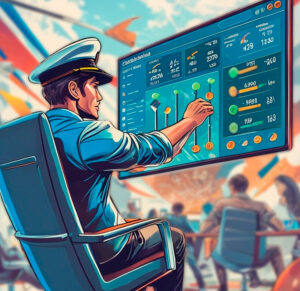
Around the World in Management Styles
Explore global management styles—from Japanese consensus to Swedish flat leadership—and learn how intercultural intelligence can boost your commercial performance internationally.
By Nadia Bulcourt – 30 January 2023

With the rise of digital technology and media, more and more brands and businesses are looking to exploit multi-channel to reach a wider audience. But what is multi-channel? Simply put, it’s about using different communication channels to reach consumers. More and more companies are recognising the importance of this approach and looking to exploit its benefits for their business. But how can companies still reach their target audience through a multitude of touch points? Benefits, limitations? We take a look.
Multi-channel is a marketing approach that has become essential for companies. This approach aims to communicate and sell on distinct interactive channels.
Multi-channel is a communication strategy that involves using multiple channels to reach customers and prospects. It is a technique that maximises a company’s chances of targeting people interested in its products or services. Channels used can include email, social networks, SMS, telephone, chatbots, websites, etc. However, these channels are not just about online platforms. They also include selling in physical shops or at markets and trade shows.
By using a multi-channel approach, companies will track customer interactions more accurately and regularly across different channels. This approach allows them to better understand the needs of their customers and thus help them make their purchase decision. The customer receives more personalized attention.

The challenge for companies is to make a place for themselves in a highly competitive world. To do this, it is essential to make yourself known in your market. By making good use of different communication channels, your company is likely to find the right customers and address them correctly. The key is to find a balance between all these channels in order to maximise their effectiveness and profitability. A multi-channel approach has several advantages for businesses. Here are a few of them.
Increasing brand reach
By using different communication channels, a company can reach a wider and more diverse audience, thus increasing its visibility and brand recognition.
Giving visibility is essential in our business and we have already talked about it with the EDHEC community (https://www.youtube.com/watch?v=FFCUGAub4eY)
Customers appreciate having different options to communicate with a company, such as telephone, online chat, social networks, etc. They can choose the channel that suits them best, making the customer experience much more consistent. They can choose the channel that suits them best, making for a much more consistent customer experience. The multi-channel approach then becomes a way for companies to offer more personalised services to customers. This allows them to respond more accurately to the needs and preferences of consumers and helps them to make a purchase. As a result, the multi-channel strategy makes the company much more available and accessible throughout the customer journey.
By using multi-channel, a company will collect a wealth of data on the preferences and behaviour of its customers. This data is essential to adjust marketing and communication strategies accordingly. Relevant data analysis gives the company a big advantage. It will provide a better understanding of their customers’ motivations. And in the process, they can improve some marketing and logistical operations to increase sales.
Opportunities for growth
Thanks to the variety of communication channels, a company has the possibility to discover new growth opportunities, such as other growth markets or market segments.
Commercial outsourcing can be extremely effective in achieving this quickly and without risk.
Companies can use the most suitable channel for promotional campaigns and other channels for retention. The advantage of relying on different communication channels is that the company can save money if it chooses its channels well. Indeed, not all channels have the same cost. Email, SMS marketing or social networks have a lower cost than traditional media. This is a significant advantage when communicating with your customers.
In summary, the use of multi-channel allows companies to better target their audience, collect valuable customer data and improve the overall customer experience. This opens up new opportunities for growth and allows them to be more responsive to market changes.

Yes, multi-channel has its limitations. We have identified some of them to help you make up your mind.
Controlling high costs
First of all, it can be expensive for a company to implement a multi-channel system. Setting up and maintaining different communication channels can be expensive for a sme, especially in terms of staff, technology and software. For example, qualified staff are needed to manage and analyse the data collected through the different channels. This comes at a cost that needs to be borne.
The complexity of communication channels
Managing different communication channels can be complex if you run a small organisation, especially in terms of coordinating and synchronising marketing and communication efforts.
Multi-channel can lead to a risk of fragmentation
By using too many channels, you risk spreading yourself too thin and diluting your efforts, rather than focusing them on the most effective channels. Furthermore, if companies do not ensure that their messages are consistent across all channels, this can quickly have a negative effect on the company’s reputation and relationship with its customers.
Difficulty in tracking performance
It can be difficult for a small business to track and measure the performance of all its different communication channels. Effective multi-channel management requires increased expertise in marketing and communication, which is not easy for a company with limited resources.
In summary, using different communication channels can be costly and complex for a company, especially in terms of coordination and performance monitoring. It is therefore important for companies to assess the costs and benefits of using different channels before using them, and to focus on the most effective channels.

First and foremost, a company needs to clearly define its objectives and the audience it wants to reach. By knowing its buyer persona, it will be able to determine its preferred communication channels. Once this is done, the company can start to develop content and plan its distribution on the different channels. It should also take into account the behaviour of consumers and adapt its strategy to meet their expectations.
The operational business strategy you want to deploy must be clear and multi-channel is a tool (not an end in itself!) to carry out this strategy for the benefit of your prospects and customers, who have different needs and are at different stages of your sales cycle.
You will now select the most relevant communication channels according to the objectives of the strategy, the market and your customers. At the beginning, you can test if you are not sure which channels to use. For example, if your persona is a sales manager in a large company who is looking for sales performance from his teams, he might look for a better CRM tool. Either he will go to trade shows, or his employees will search for this type of product on the internet. So it’s up to you to use the right channel to create the most targeted interaction with your persona.
In this type of case, your company will therefore deploy a communication strategy by planning a stand at the trade fair where your persona will be visiting. It will also be useful to create an online presence on social networks, in order to announce the event on site and to make yourself available on the internet. In short, adapting your communication channels to your persona is a major element in a successful multi-channel strategy.
Don’t forget to set up tools to monitor the performance of each channel and campaign. This step will help you optimise your efforts and results. Based on the results, you will be able to make the necessary adjustments to achieve your goals. It is also essential to continue to monitor market trends and customer preferences to further optimise your multi-channel strategy.
The use of different communication channels therefore has many advantages for companies and allows for a more effective reaction to market developments. However, there are some limitations to multi-channel, and the costs and benefits of using it should be carefully considered. It is best to focus on the most effective channels and then develop a well-planned and coordinated multi-channel strategy to achieve the desired objectives. We can also give you some tips that have worked for us and our clients, here!

Explore global management styles—from Japanese consensus to Swedish flat leadership—and learn how intercultural intelligence can boost your commercial performance internationally.

The adaptive leader, like a chameleon, adjusts in real time to effectively orchestrate a hybrid and connected team.

Looking for commercial results without the recruitment delay? Discover how a fractional Sales Director can hit the ground running and drive performance from day one.

Spring is a turning point in your business dynamics. Take stock of your commitments, realign your teams, and boost your results before summer.

Feeling the winter drag on your team? Reignite connection, clean your tools, and give your people purpose with 3 actionable ideas from Finelis.

Spring is a strategic time to boost your business. Discover how to align your sales efforts with seasonal cycles and turn the transition into a growth driver.